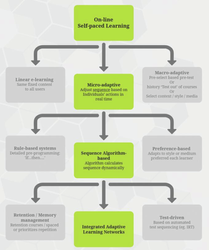/
Adaptive Learning for Professional Ed
Adaptive Learning for Professional Ed
McGraw-Hill (article)
- Meta-cognitive: know thyself → confidence
- Efficiency: deliberate practice
- Engaging: challenged appropriately, per game design
- Retention: long-term knowledge via spaced repetition
Area-9 Learning (infographic)
- Corporate training that
- meets them where they are
- meets the specific needs of their job
- One-size-fits-none, "Biological approach"
- Designing learning programs → creating customized learning paths.
- Retention: Recharges your brain
- Efficiency: Cuts down on learning time by 50%
- Meta-cognitive: Uncovers what you don't know you don't know
- Track Progress: Enables reporting
BitSchool (whitepaper)
CogBooks (whitepaper)
- Categories of self-paced learning platforms
- Linear - fixed linear sequences.
- Negatives: Inefficient; Disengaging
- Macro-adaptive - pre-determined sequence based on either
- Learner's preference
- Negatives: Not supported by research; Extensive authoring effort
- Learner's performance on pretests
- Negatives: "Snapshots" of learner's competency gets outdated; Over-reliance on tests
- Learner's preference
- Micro-adaptive - continuously tailor learning delivery based on the student’s ongoing actions at every step.
- Positives:
- Dynamically adjust based on most recent actions.
- Skip unnecessary activities.
- Automated, personalized support.
- 3 types:
- Preference-based - adapt based on learner's style and behavior
- Negatives: Not supported by research; Extensive authoring effort
- Rule-based - pre-programmed sequence based on user's actions.
- Negatives: Limited extendibility; Extensive authoring effort
- Most applicable to subjects such as basic math and basic science.
- Algorithm-based - data-driven algorithms determine sequence as student progresses.
- Positives:
- Less authoring effort.
- Data-driven: amenable to self-improvement and data analysis.
- 3 types:
- Memory retention - spaced repetition (per pedagogical research)
- Most applicable to memory intensive learning activities such as learning language vocabulary or medical exam study.
- Assessment-driven - optimizes individual assessments and dynamically adjust sequence of assessments.
- Assessments ranked by:
- differentiation (how well they assess what the learner knows)
- difficulty (the relative likelihood that a member of the population will get the assessment correct)
- Frequently uses Item Response Theory.
- Negatives: Heavy focus on testing detracts from learning effectiveness.
- Most applicable to test preparation, exercise drills, and teach-to-test scenarios.
- Assessments ranked by:
- Integrated network - Algorithm determines next best learning item, relying on relationships identified between learning activities.
- Inputs include: learner’s knowledge profile, learner’s behavior, retention, recommendation, and profile data.
- Positives: highly personalized at each step; flexible; scalable for authors; content agnostic; based on recent learning theory.
- Memory retention - spaced repetition (per pedagogical research)
- Positives:
- Preference-based - adapt based on learner's style and behavior
- Positives:
- Linear - fixed linear sequences.
, multiple selections available,
Related content
Adaptive Learning Resources
Adaptive Learning Resources
More like this
Adaptive Learning
Adaptive Learning
More like this
Adaptive Learning Tools and Engines
Adaptive Learning Tools and Engines
More like this
Adaptive Learning WG Use Cases
Adaptive Learning WG Use Cases
More like this
Adaptive Learning Glossary
Adaptive Learning Glossary
More like this
Adaptive Experiences (behavior, styles, etc)
Adaptive Experiences (behavior, styles, etc)
More like this
